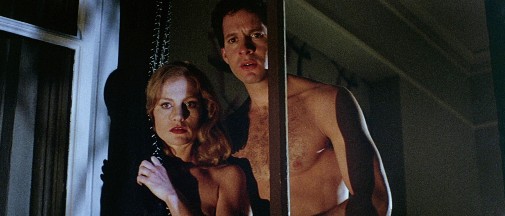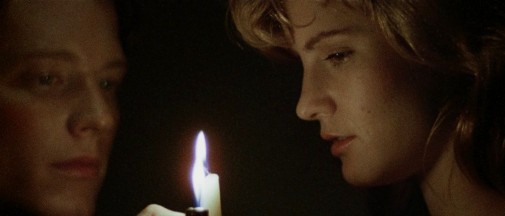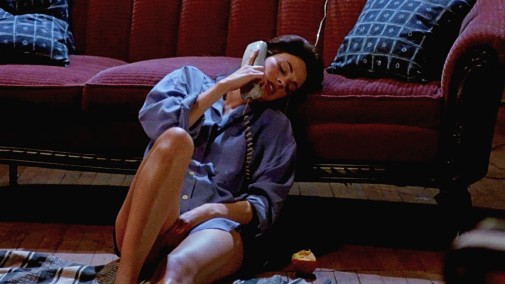Erotic Thrillers: Part 3 – Bare Witnesses
 Thursday, April 20, 2023 at 1:00PM
Thursday, April 20, 2023 at 1:00PM 
Making your way through the Criterion Channel's Erotic Thrillers collection, you'll start noticing a recurring concept here and there. One of the most prevalent is voyeurism (peeping toms or bystanders) twisted by the advent of violence. That very idea can lead to a consideration of the audience as another variation of the voyeur, whether in a critique or apologia. Fear and desire often mix, the horrified spectator enlivened by the hideousness they just saw even as trauma lingers in the psyche. Excited by danger and drunk on terror, they're laid bare for the camera in more ways than one.
As our cinematic odyssey reaches the end of the eighties, we encounter three tales of eroticized witnessing – Curtis Hanson's The Bedroom Window, Bill Condon's Sister, Sister, and the program's first woman-directed picture, Sollace Mitchell's Call Me…

THE BEDROOM WINDOW (1987) Curtis Hanson
At the end of a ritzy office party, promising executive Terry Lambert has an illicit liaison with his boss's wife, Sylvia. The affair has been going on for quite some time, though tonight, things don't go according to plan. In the afterglow of sex, while he's in the bathroom, the married woman is drawn to the window by a strange noise. Naked and vulnerable, she witnesses an attempted rape. While the assailant runs away, the next day, a murder is reported nearby, giving the impression that, after one failed attack, the man went after another woman. Sylvia doesn't want to report what she saw, for it could reveal her adultery, so Terry contacts the police, passing her information as something he witnessed directly. It all goes wrong from there.
As played by Steve Guttenberg and Isabelle Huppert, there's a lascivious note to how the lovers obsess over their closeness to the killing. It's like they have an adrenaline hard-on that's only abated when the consequences of their actions become a bit too real. Moreover, it never feels like they want to do the right thing. Rather, he wants to play the hero, and she wants to keep the status quo no. Despite this, Sylvia goes to court to see the proceedings, standing out from the crowd in a turbaned getup worthy of a 1940s MGM star. Matching in idiocy, they deserve each other. But, unfortunately, neither actor ever seems comfortable in their role.
Guttenberg's screen presence could best be described by one of those pet photos dog owners will post on their socials with a caption like "no thoughts, head empty." Good for a romcom, perhaps, but not for an erotic thriller. As for Huppert, she's glamorous and venal without ever becoming more than a surface-level temptress. The supporting players thus steal the movie, from Wallace Shawn's defense attorney to Brad Greenquist's wordless murderer, a Tintin-looking motherfucker that's turned into something bigger than life when considered by Hanson's camera. But of course, the main reason to watch The Bedroom Window is Elizabeth McGovern.
She's Denise, the rape survivor who takes matters into her own hands when the justice system fails. Repudiating conscriptions to classic victimhood, the character becomes active in trying to solve the mystery and catch the predator. She's dry and matter-of-fact, projecting intelligence holding hands with calculated ferocity. Hanson seems to realize this, giving the actress more space to dominate her scenes than he allowed the putative leads. Even as the film loses steam in its final act, McGovern gives it purpose, conveying an impression of depth that, to put it bluntly, isn't there when she's offscreen.
At least the filmmakers have a sense of style. You got to love the cheekiness of a Poe-themed bar, complete with neon nevermores scribbled over the walls. Then there's a colorful aquarium-set scene that's a wink toward Lady from Shanghai, adding Wellesian influence to what could have been dismissed as Hitchcock pastiche. One murder is floridly shot like lovemaking on the wings of a theater, victim and attacker ensconced in shadow like a pair of secret lovers. The gasp of a life ending is akin to the little death, sordid romantic elegance that's ridiculous and riveting. Still, Hanson is no De Palma, no matter how many tricks DP Robert Towne might have up his sleeve.

SISTER, SISTER (1987) Bill Condon
This directorial debut has what it takes to be a camp classic, from its ludicrous story to an aesthetic sensibility overbaked to the extreme. It all starts in a wet dream with the wet part underlined. Jennifer Jason Leigh's Lucy fantasizes about a beautiful stranger coming into her bedroom to satisfy every forbidden desire. Then, we wake up and encounter a reality very different from the dream's liberated sensuality. Candles, crosses, swamp dampness, mist and mildew are familiar sights between worlds. Still, Lucy's mundane life is defined by infantilization at the hands of her controlling older sister, Charlotte, played by Judith Ivey.
They're the proprietors of a mansion turned guest house, living their deep-fried Southern Gothic fantasy in the Louisiana bayou. But of course, Charlotte does most of the work, leaving Lucy to run through the landscape like a mystical nymphet yearning for a man's touch. Though their low-class childhood friend Etienne seems eager to fulfill the part of lover, the young woman's eye is drawn to Matt, a mysterious out-of-towner staying with them. As lensed by Condon and cinematographer Stephen Katz, Eric Stolz is a figure defined by a lustful gaze, bewitching the frame in a move that reveals Sister, Sister as an equal-opportunity exploiter.
In no time, the mansion is a pressure cooker of sexual tension and dark secrets, ready to explode in violence. Take Richard Einhorn's score, scratching at the audience with plaintive strings, a tenor of romance so intense it can be stifling. It's the sonic equivalent of walking into a room smothered in perfume - you feel slightly suffocated by the sweetness. Still, if you engage with it in good faith, there's something to be appreciated in the unbridled bigness. Engage with it in an ironic mood, and you'll get a good laugh. The cinematography is similarly ripe to the point of rot, as is the scene-stealing Anne Pitoniak. As a bitchy guest with a two-tone hard front and diva shades, she's perfect.
Not every aspect of the flick follows her example. Arriving at the final acts, the script unravels through increasingly implausible twists and terrible dialogue. The audiovisual boldness comes to a boil to save the day, and so does the underlying horniness. We even see a blonde hunk have his Saint Sebastian moment above gator-infested waters. As insanity spills over the narrative, it starts to work more as a silent horror cum comedy than talkie melodrama. Pity about the too-neat conclusion and how it tries to tie a polyester lace bow around the sordid tale.

CALL ME (1988) Sollace Mitchell
In The Bedroom Window, Sylvia witnesses an attempted rape from which the entire narrative cascades. In Sister, Sister, the mystery is explained in flashback, a witness to death grown into a murderer. In the case of Call Me, our protagonist witnesses a violent killing that seems to have little effect on her beyond the mess of a plot it ignites. Indeed, the premise of this directorial feature debut isn't even that concerned with the trans woman of color who gets butchered early on, victim to a cop looking for money and in the mood for a hate crime. Instead, Call Me is about the relationship between risk and pleasure, centering around obscene phone calls Patricia Charbonneau's Anna receives in her lonely New York apartment.
At first, thinking it's her boyfriend putting on an act, she agrees to meet the man at a Polish bar, only to realize it's not her stuffy beau after all. He never shows up, but she sees the murder from the vantage point of the women's toilet. Panicked, Anna flees, unknowingly implicating herself in a corruption scheme that will make her the target for a pair of criminals, including a baby-faced Steve Buscemi. In turn, we have converging plots that never make sense in the same movie. The prank caller is the exciting part, especially as Anna grows obsessed with the lewd voice. The criminal plot never gels, though it inspires nifty camerawork from Mitchell – stalking scenes are often filmmaking ambrosia, as we well know.
In this game of fatal feminine fantasies come true, heroism and villainy are separated by very little, though a bad boy is always better than some bland everyman. Similarly, the cityscape is best when the camera acknowledges the filth of dirty streets and cheap apartments, all made beautiful in sunset light to the sound of a saxophone blaring away. Tricks of slippery POV also delight, as does the dialogue's frankness about desire. But such merits aren't enough to redeem the movie's worst attributes. Those would be the dysfunctional structure, a racist streak peppered with transphobia, unconvincing romance, and bad acting. Poor Charbonneau can't make the impossible ending work. She crashes and burns, taking the film along with her.
How are you enjoying this Erotic Thrillers series? Hopefully, it's as much fun for you as it is for me.



Reader Comments (3)
I have seen Bedroom Window and it's nearly unwatchable,never heard of the other 2,bring on Basic Instinct.
Early 1980s Steve Guttenberg made me gay, to be honest. He has an understated sexual come-on not many people see -- but some movies capitalize on it. [See his naked scenes in The Man Who Wasn't There, and Can't Stop the Music.]
sandwichspy -- Though I didn't appreciate his performance, I must confess that Steve Guttenberg was a sight for sore eyes in THE BEDROOM WINDOW. I should probably check out those other titles you mention. Thanks.